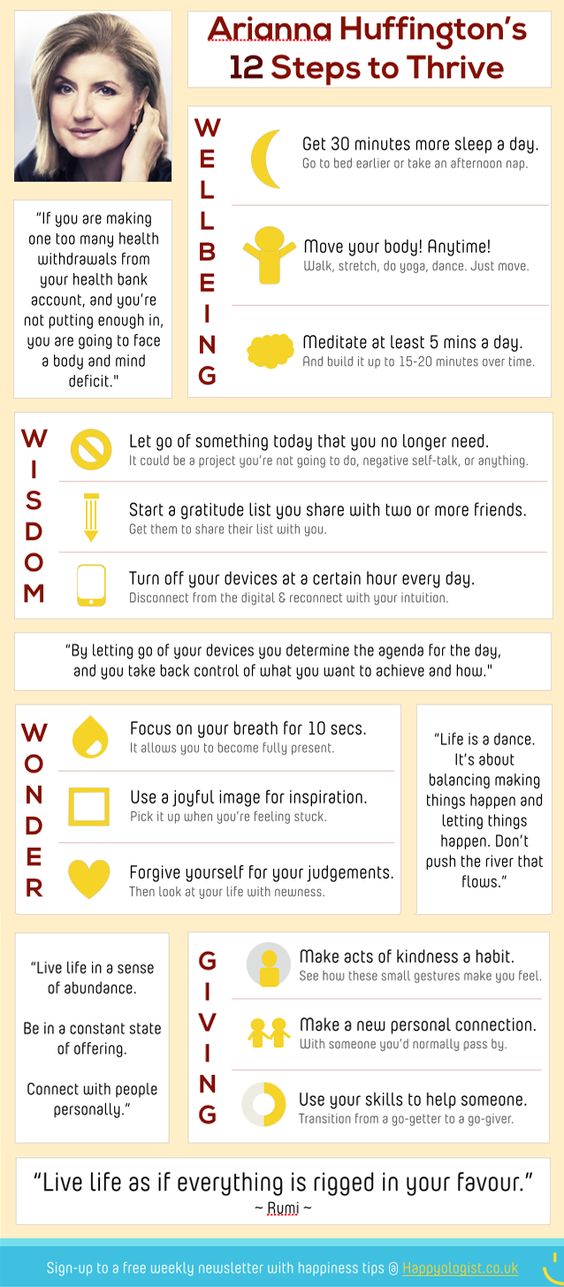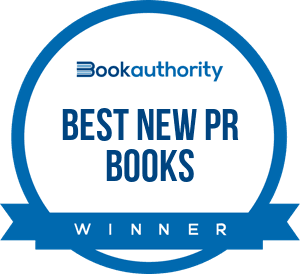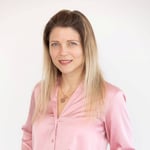On the scale of one to ten, 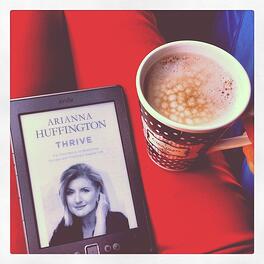 with ten meaning "extremely" and one meaning "not at all", how successful would you say you are? How accomplished do you feel? How satisfied are you with your career and professional life? I hope your answers lie somewhere close to ten. Now, let me ask you some more questions: How stressed would you say you are? How satisfied are you with your relationships and personal life? How happy are you?
with ten meaning "extremely" and one meaning "not at all", how successful would you say you are? How accomplished do you feel? How satisfied are you with your career and professional life? I hope your answers lie somewhere close to ten. Now, let me ask you some more questions: How stressed would you say you are? How satisfied are you with your relationships and personal life? How happy are you?
If you gave all those questions an answer close to ten, congratulations! You are one of the very few lucky people in this world who's got it all!
Now, let's talk about the rest of us - the ones who still feel there's something missing, there's something to improve, there's something more to do and work on so that we feel truly accomplished and happy at the same time.
That journey towards true happiness in our personal as well as our professional lives starts with our definition of success, or the way society as a whole pictures what success should look like. And for the past decades that picture has unfortunately been rather distorted.
This is one of the messages of Arianna Huffington's, founder and president of the Huffington Post and best-selling author, new book "Thrive: The Third Metric to Redefining Success and Creating a Life of Well-Being, Wisdom, and Wonder".
Having been deeply inspired by Arianna's commencement speech at Smith College, I was eager to start reading the book the minute my pre-order was delivered on my Kindle. And I loved it.
The way the book is written is extremely personal, filled with Arianna's many eye-opening experiences and lessons learned, backed up by multiple worthwhile examples and research findings as well as extraordinary real-life moments.
Arianna has a way with words and manages to guide you through the book with masterful storytelling and narrative, speaking of a new way, a healthier way of defining and measuring success and learning how to thrive.
In today's world of male domination at the corporate side, success is defined by two single metrics - money and power.
The very problem behind that definition is that it leads to burnout - yes, that simple, burnout. We live in a culture of overwork and burnout. We are overstressed, overactive, overburnedout (I just made up a new word). I'm sure you agree with me and Arianna that this is unsustainable and needs to change because being successful at work doesn't necessarily mean that we are successful in life. And this is why we need a third metric for success.
That Third Metric according to Arianna consists of four pillars: well-being, wisdom, wonder and giving.
Well-being
The first key element of the Third Metric, well-being, basically says that taking care of ourselves should be just as important as our career goals - I would say even more important, because without being well (emotionally and physically) we won't be capable of achieving these professional aims.
Overwork, burnout and sleep deprivation have deep negative effects on every part of our mental and physical health as well as our performance at work. Working 24/7 doesn't necessarily mean that you are working well. Excelling at our jobs is profoundly defined by our well-being. In our twenties we might have the energy to sleep less and work all the time, but this will have an effect on our health and performance at a later stage.
The need for a wake-up call
As Arianna puts 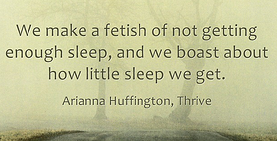 it, "the Western workplace culture—exported to many other parts of the world—is practically fueled by stress, sleep deprivation, and burnout." And it's this perception of society that's really wrong: "working to the point of exhaustion and burnout is considered a badge of honour."
it, "the Western workplace culture—exported to many other parts of the world—is practically fueled by stress, sleep deprivation, and burnout." And it's this perception of society that's really wrong: "working to the point of exhaustion and burnout is considered a badge of honour."
Being a workaholic is nothing to be proud of, if you don't allow yourself the time to renew and recharge.
Well-being is our top priority because our human capital defines our professional capital. Climbing the career ladder is ultimately made possible by both professional and personal growth because when you're exhausted you don't see clearly and it's more difficult to recognise opportunities as well as threats.
Burnout and sleep deprivation - the 21st century work diseases - negatively affect our work performance, productivity, emotional intelligence, assertiveness, creativity and ability to make decisions and to enjoy life, including our successes along the way.
We should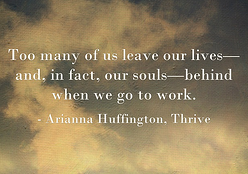 therefore stop depriving us from sleep and we should make more room to unplug and reconnect with ourselves - to recharge and renew ourselves, including spending more time with the people we love. Even if our professional careers are our top priorities (as it is for me at the moment), they shouldn't come at the cost of our health or our relationships with others.
therefore stop depriving us from sleep and we should make more room to unplug and reconnect with ourselves - to recharge and renew ourselves, including spending more time with the people we love. Even if our professional careers are our top priorities (as it is for me at the moment), they shouldn't come at the cost of our health or our relationships with others.
Challenge the status quo
So what is of true value to us?
Now is the time to sit back, take a few deep breaths and re-evaluate what brings the most value in our lives. Is it really just having more money, buying more stuff and bigger houses and climbing the career ladder at the highest speed possible?
Set your priorities straight
What we really need is to give ourselves pauses and take care of our own human capital - that doesn't mean stopping to work hard, it means stopping burnout. You can still stand out at the office, if you occasionally allow yourself to unplug so that you can really thrive.
About a year and a half ago I made a commitment to myself to try and take better care of ME - my body, my health, my mental condition.
Just as Arianna, I'm a "sleep evangelist" too. My sleep is more important to me than the next party. I sleep 7-8 hours a day, I wake up early so that I can work out every day before heading to the office and I plan my evenings carefully so that I can get enough rest.
Everyday sport activity has become my top priority not just because I want to look good, but mostly because I want to be healthy and fit, especially considering that my job requires me to sit in front of a computer all day long.
I've made exercise part of my morning routine. The first thing I do after I open my eyes is working out: my alarm wakes me up, I stand up, put my sports clothes on and just do it. This way my brain doesn't even have the time to think about whether to exercise or not. And those are no easy workouts to do at 6am - check out Insanity, The Asylum and Focus T25 Gamma.
But there's one other thing: I've spread the move too. I've given many of my friends and some of my colleagues the workout programmes. They may not be as addicted to them as I am, but they are enjoying the workouts and are seeing the benefits.
I have also adopted a very healthy eating lifestyle - I learned how to read labels, what the healthiest foods are, what to avoid and I developed my own eating plan, which I am very happy with even it if is not super diverse every day. I eat a lot of proteins, veggies and fruits - at least three types of veggies a day and at least five types of fruits. The result: I have never felt better in my life!
Sleep, exercise and healthy eating are my ultimate ingredients to a productive, creative and quick mind.
Another thing 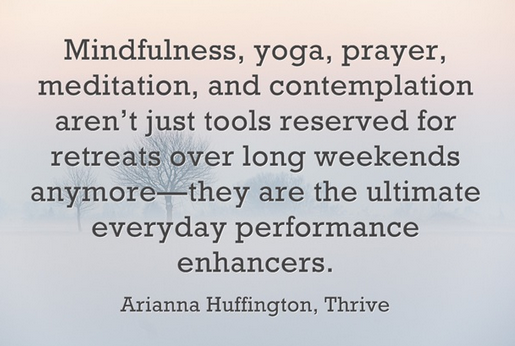 Arianna suggests as one of the easiest and most effective ways we can become more peaceful, healthier and happier is through mindfulness and meditation. She even calls meditation a "miracle drug" that additionally trains the brain to experience the world in a different way and allow us to see clearly.
Arianna suggests as one of the easiest and most effective ways we can become more peaceful, healthier and happier is through mindfulness and meditation. She even calls meditation a "miracle drug" that additionally trains the brain to experience the world in a different way and allow us to see clearly.
Companies to take action
There's much we can do to work on our personal and career growth by being driven by the Third Metric. However, companies are also required to change their corporate cultures and put a serious emphasis on employees' well-being. Why? Because healthy and happy employees are productive employees, who would not only do the job well, but would choose to stay with that company because it gives them something more than just a monthly pay - it adds real non-monetary value to their lives.
Consider this: France now declared responding to emails after 6pm illegal! This is the country's way of fighting burnout and protecting its people's health.
Healthy people are happy people. Healthy people are capable people too.
Wisdom
The second pillar of the Third Metric - wisdom - is found when we manage to disconnect ourselves from all those gadgets, devices and tasks and reconnect with our beloved ones and with ourselves as human beings. It's about finding purpose in life by re-evaluating our current lifestyles and recognising what we really want to realise that, as Arianna says, everything from losses, misfortunes, successes, surprises and joys happen for a reason. Everything we encounter teaches as something because "life is a giant classroom."
Time famine and hurry sickness
Due the way the workplace is currently structured, however, we are always busy, we never have enough time for anything and we still push ourselves to do more and tick off more items on that never-ending to-do list. We are in a constant state of time famine and hurry sickness that doesn't allow us to take a break and think about our more profound needs and desires apart from trivial worries and deeds.
But connecting to ourselves and developing inner resilience is key to support our "emotional and mental bank account" so that we can react to various situations with wisdom.
Slow down and trust your instincts
Arianna explains that "one big indicator of the absence of wisdom is our failure to heed warning signs." We need to listen more to our intuition - our inner knowing - and act upon it so that we can thrive, instead of ignoring those hunches as we often tend to do.
But the 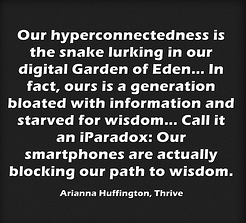 biggest barrier here is our current dependency on and in some cases addiction to technology. Nowadays, we cannot function without our devices - our smartphones, laptops, tablets that we rarely leave out of sight. We go on holiday, but we are not really on holiday as we are always checking our e-mails, Facebook, Instagram etc. We never really disconnect even if our own bodies and minds tell us we should and even when we know that that's true.
biggest barrier here is our current dependency on and in some cases addiction to technology. Nowadays, we cannot function without our devices - our smartphones, laptops, tablets that we rarely leave out of sight. We go on holiday, but we are not really on holiday as we are always checking our e-mails, Facebook, Instagram etc. We never really disconnect even if our own bodies and minds tell us we should and even when we know that that's true.
Wisdom is about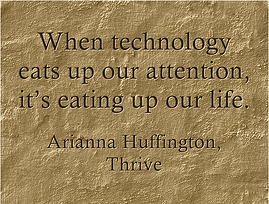 consciously developing new habits, for example learning to unplug during vacations or changing the way we react to trivial challenges. So, instead of getting angry or stressed and frustrated and allowing that negative self-talk to go on and on in our heads, take a deep breath, examine, think about the issue and make a choice to face it.
consciously developing new habits, for example learning to unplug during vacations or changing the way we react to trivial challenges. So, instead of getting angry or stressed and frustrated and allowing that negative self-talk to go on and on in our heads, take a deep breath, examine, think about the issue and make a choice to face it.
The only way to learn to listen to our "inner voice" and discover wisdom is by practice. So, the next time you start wondering whether to trust you instinct and why you should or shouldn't, just take a risk and do what your hunch tells you.
We also need to learn to slow down, not just at work or in live, but also our minds and that noise that's happening in our heads. Only so we'll be able to really reflect on our experiences and manage to appreciate them.
Wonder
The next key element of the Third Metric is wonder or "our sense of delight in the mysteries of the universe, as well as the everyday occurrences and small miracles that fill our lives." It's both about outer and inner space - not just what we see or experience with our physical senses, but also our perspective of it and what we feel as a result.
I see the third element as a way to insert more positivism into our everyday lives.
We as creatures tend to react to the negative much more strongly than to the positive. We see the bad before the good. The majority of us are not immune against this flaw. We complain and we get angry over little things, just because we can, instead of simply taking a second to think and allow us to see the bright side.
Open your eyes and see the world around you
What we should do is open our eyes, ears and hearts and start paying more attention to the good things and make more room for wonder in our lives.
To do so we need to discover what gives each one of us food for the soul.
Arianna says that "nature and art are two of the most fertile grounds for experiencing wonder" and I agree with her.
I've been lucky enough to have been able to travel quite a lot in the past few years. I remember last winter when I got to see The Kiss by Gustav Klimt at Belvedere palace in Vienna with my own eyes. I stared at it for more than 30 minutes when I noticed how people were staring at me, including the guard, as if I was going to steal the painting, while I was simply admiring it for a longer period of time than the majority of visitors do.
Speaking of the Belvedere museum, another recent memory comes to my mind: a week ago I experienced wonder at its purest form at the Van Gogh Museum in Amsterdam. The art pieces were, of course, marvellous and the multimedia tour the museum offered was so brilliantly put, allowing you to not only learn about the artist, his work and his life, but also about actual painting techniques through videos, about how the pieces were planned and executed, and you also get the chance to try things out yourself - for example restoring the original colours.
You don't have to travel the world to experience wonder. In every city there are museums and galleries or exhibitions of local artists that you can visit. As Arianna puts it, these are among the few precious oases that allow us to disconnect from our always-on hyperconnectedness.
Giving
Well-being, wisdom and wonder are incomplete without the last element of the Third Metric: giving. Giving is about stepping out of our comfort zones and egos and showing empathy, compassion and willingness to help the people and communities around us. As the first three elements guide our personal choices, Arianna speaks of giving as service that "naturally follows as the response to the wake-up call for humanity." This selfless service is defined as "empathy and compassion in action" and "a miracle drug (with no side effects) for health and well-being."
Giving as key to build a sustainable future
Giving is particularly important in our fast-tracked world that is facing multiple societal and environmental challenges, endangering our planet and well-being. In my view, giving is the only way to building a truly sustainable future. But it has to come from individuals as well as entire communities and organisations, which is why I've been talking about corporate sustainability so much lately.
Unfortunately, most of the time we're so self-absorbed that we fail to see the people and problems around us. We need to become more mindful, because the very essence of mindfulness is simply paying attention through heightened compassion and consideration of the impact of one's actions on others, or put another way, "mindful behaviour is behaviour that is socially responsible".
As Arianna explains,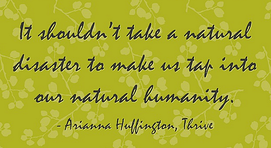 "service is not only about going to homeless shelters and food banks—vitally important as that is. It’s also about offering whatever special skills and talents and passions we have" or "giving joy to others—sharing our talents and skills to help them tap into their own ability to experience wonder."
"service is not only about going to homeless shelters and food banks—vitally important as that is. It’s also about offering whatever special skills and talents and passions we have" or "giving joy to others—sharing our talents and skills to help them tap into their own ability to experience wonder."
So, Arianna advises us to make small gestures of kindness each day and nurture personal connections by not taking the people we meet daily for granted (including the clerk, the bartender or the cleaning crew). This way we can make the transition from go-getters to go-givers.
The need for a paradigm shift
The timeless and most profound truth that Arianna's book gives us is that life is shaped from the inside out. If you are happy, if you feel good, you simply perform better and faster - we don't need major research findings to tell us that, we have all experienced it firsthand. Being in a good mood, which in its essence is a result of feeling good and being happy, makes us see things in a different way than when we are stressed or depressed. In the latter situations we are less capable because it's harder to focus: our minds tend to always drift to some unhappy thoughts, distracting us from our work and so we procrastinate. When you feel good, your brain works faster and gets things done as you are better able to focus because you are motivated by feeling good.
To feel good, we need to be in a good physical and emotional condition. The physical part is strongly influenced by our lifestyles, including what we eat and drink, how much we sleep, how much we exercise etc. The emotional, on the other hand, is impacted by our inner feelings such as joy, happiness, sadness, anger etc., which are, in turn, driven by internal or external occurrences and situations that trigger specific reactions in our brains (and hearts).
To align the inside with the outside we need a paradigm shift - a new understanding of our own reality.
Creating a life that's meaningful to me
Having started my own journey towards success and wanting to make sure that my personal and career growth will be sustainable, this blog post is my commitment to make the Third Metric principles permanent part of my daily life.
For me, the first element - well-being - is the most important one, because without it you cannot experience or truly enjoy the other three.
But they are all a personal choice. It's up to you to embrace the Third Metric.
I've already put my health at the top of my priorities by making exercise an invaluable part of my daily routine and developing healthy eating habits.
But there's more to do.
Leading a successful, healthy and happy life starts with dedication and taking small steps.
My first one is meditation. Following Arianna's advice I was eager to try it out. I discovered this really cool tool called Headspace that guides you through meditation in just 10 minutes a day for 10 days. And I must say, it has made a difference - I've found some sort of peace of mind and I now react to things differently, more calmer and more consciously.
The second step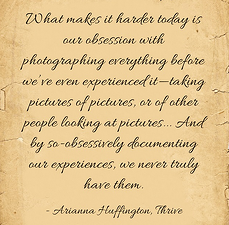 is trying to spend more time with friends and family and leaving my phone away during that time, i.e. really unplugging and recharging. I'm off to Rome for a short holiday meeting my mom, dad and sister there, who are coming from Bulgaria. I was planning on turning my Internet connection with my roaming on my phone for these few days so that I could share my experiences in real time, but now I decided not to do so and really be on holiday by truly experiencing those experiences.
is trying to spend more time with friends and family and leaving my phone away during that time, i.e. really unplugging and recharging. I'm off to Rome for a short holiday meeting my mom, dad and sister there, who are coming from Bulgaria. I was planning on turning my Internet connection with my roaming on my phone for these few days so that I could share my experiences in real time, but now I decided not to do so and really be on holiday by truly experiencing those experiences.
The key to thriving
The life-changing and key learning from the book is that the pursuit of professional success should be aligned with the pursuit of overall happiness, of career as well as personal dreams and passions. There's no need to sacrifice one for the other.
Which is why, my choice is to commit. I choose to pursue my dreams and passions and I choose to do it the healthy way. I choose to lean in and be happy.
I am committing because I don't want to just succeed, I want to thrive.
Do you?
If so, here are 12 steps to get you started!
